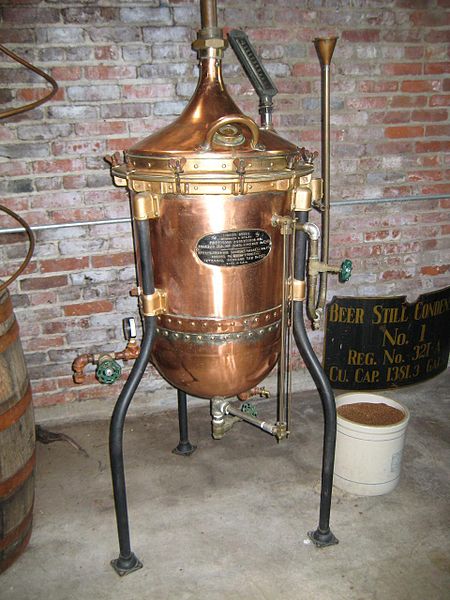Baijiu, or shaojiu (烧酒/燒酒), is a colorless Chinese liquor typically coming in between 35% and 60% alcohol by volume (ABV). Each type of baijiu uses its own type of qū for fermentation to create a distinct and characteristic flavor profile.
A glass and bottle of “Jiugui” (酒鬼) brand baijiu
A Guojiao distillery, featuring apparatus for traditional baijiu distillation.
Shuijing Fang (水井坊) distillery remains in Chengdu, Sichuan. Each baijiu distillery has its own qu which contains a specific microbiome that would develop their branded flavor profile. The troughs in which qu is cultured are traditionally an inseparable part of the distillery.
A bottle of Maotai (Moutai) produced in 1998 has an estimated price range of HK$195,000–293,000 (US$25,000–37,600) in an auction in Hong Kong in 2017.
Liquor is an alcoholic drink produced by the distillation of grains, fruits, vegetables, or sugar that have already gone through alcoholic fermentation. Other terms for liquor include: spirit, distilled beverage, booze, spirituous liquor or hard liquor. The distillation process concentrates the liquid to increase its alcohol by volume. As liquors contain significantly more alcohol (ethanol) than other alcoholic drinks, they are considered "harder." In North America, the term hard liquor is sometimes used to distinguish distilled alcoholic drinks from non-distilled ones, whereas the term spirits is more commonly used in the UK. Some examples of liquors include vodka, rum, gin, and tequila. Liquors are often aged in barrels, such as for the production of brandy and whiskey, or are infused with flavorings to form flavored liquors, such as absinthe.
An old whiskey still
A display of various liquors in a supermarket
Some single-drink liquor bottles available in Germany
Viru Valge, an Estonian vodka








